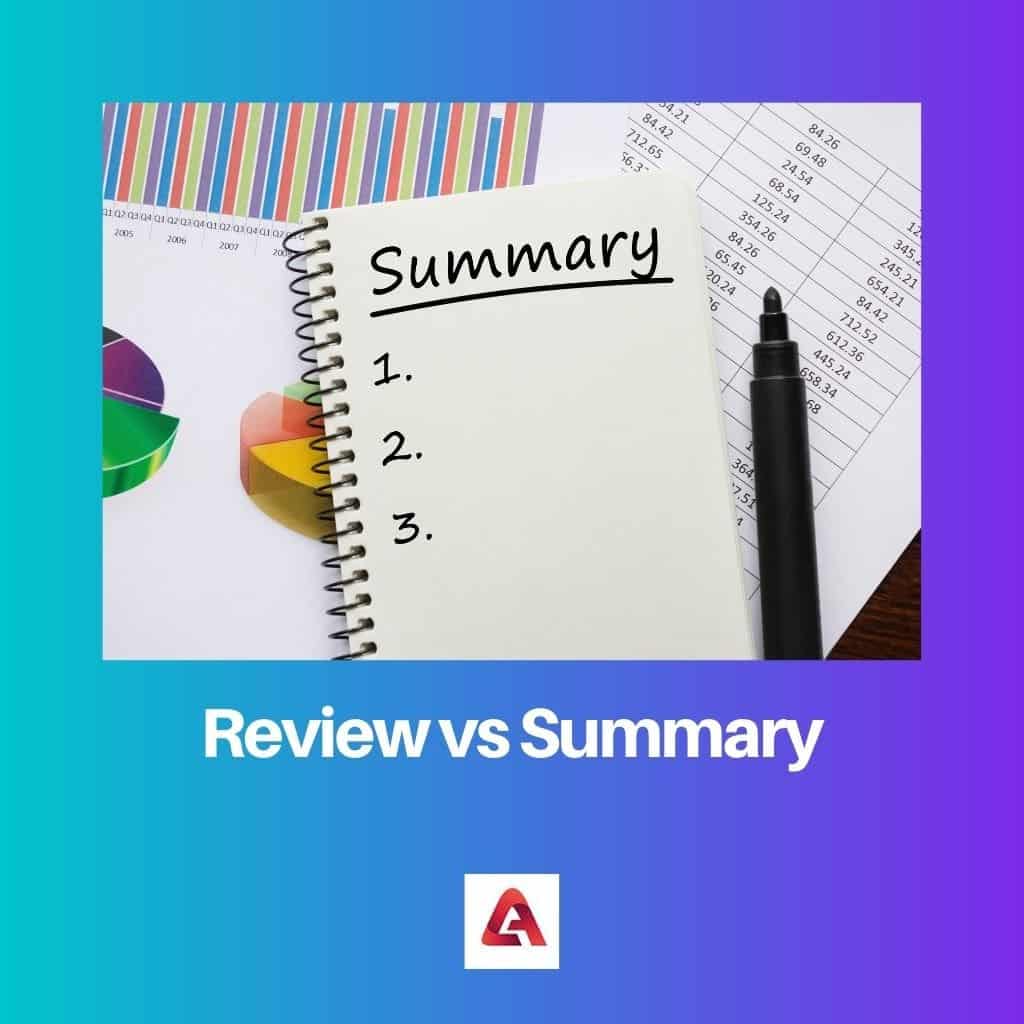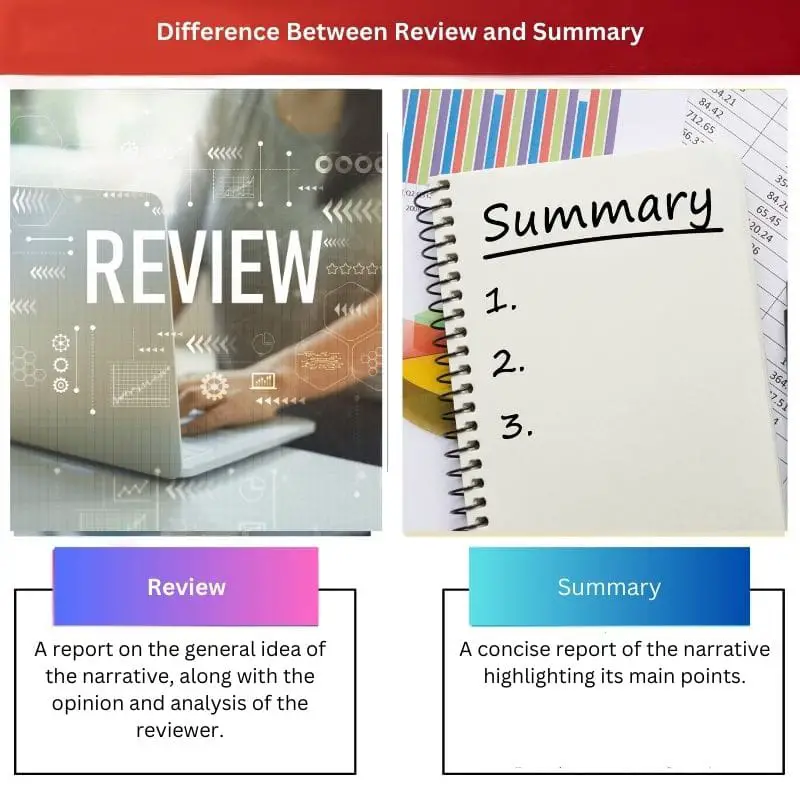A Review is a report highlighting someone’s opinion about something, its ideas, the theme, and how it affects someone or something.
Key Takeaways
- A review evaluates or critiques a work or product, providing opinions and insights on its quality, effectiveness, or value. At the same time, a summary is a condensed version of a work presenting its main points or ideas without offering personal opinions or judgments.
- Reviews include personal assessments, recommendations, and comparisons to similar works or products. In contrast, summaries focus on accurately conveying the core content or message of the original work without inserting personal opinions.
- Both reviews and summaries can be useful for understanding the content or value of a work. Still, they serve different purposes: reviews inform potential consumers or readers about the quality of work, while summaries provide a quick and concise understanding of the original content.
Review vs Summary
The difference between Review and a Summary is that Review reflects what the partaker thinks about the narrative in all aspects. In contrast, a Summary is just a shortened or condensed version of an artefact that gives the gist of the whole body.

Review can also mean a revision or subsequent reading of a text or narrative. Whereas, Summary is a broad term which refers to the short restatement reflecting the critical points of any piece of literature, argument or lecture.
Comparison Table
| Parameter of Comparison | Review | Summary |
|---|---|---|
| Basic idea | A report on the general idea of the narrative, along with the opinion and analysis of the reviewer. | A concise report of the narrative highlighting its main points. |
| Persistence | It does not necessarily include the exact points of the subject and extends to external aspects of the issue (like its effect on people). | Holds on to the exact points of the subject, and no extra matter is to be added. |
| Opinion of the partaker | The reviewer’s opinion plays an essential part and can vary from reviewer to reviewer. | Opinions of the summarizer are not to be included in the summary. It doesn’t matter how the summarizer perceives the subject. |
| Proceeding | No exact order needs to be maintained for presenting a review. | A summary proceeds in the same order as that of the subject itself. |
| Size | Includes assessment and critical analysis of the narrative in several aspects and can be lengthy. | It can be pretty short, as it is just a gist of the narrative. |
What is Review?
A review delineates the partaker’s opinion about the presented subject. It doesn’t require the exact points of the narrative but revolves around the ideas of it and the way it was presented.
This is used in formal and informal contexts like “a movie review” or “review of a research paper” and can be applied to any subject that can be presented to an audience.
There will exist no final review as every individual contemplates the subject differently. However, the study can be generalized as good or bad.
These reviews don’t necessarily account for the reviewer’s opinions and are closely related to a summary. However, unlike resumes, these reviews don’t have to highlight all the subject’s main points in the same order.
This review is not presented to an audience but is for the use of the partaker himself. The need for this kind of review arises when the partaker needs to demonstrate their knowledge on the subject, like examinations.

What is Summary?
A Summary is the concise report of any presented rendering or narrative used for a better and easier understanding. It covers all the text’s main points and gives the story’s essence in the exact order as the report does.
A summary sticks to the points of the subject and doesn’t deviate from them at all. It does not include the summarizer’s opinions or acknowledge any assessment of the issue.
Absoluteness is the backbone of a summary. Since the resume needs to hold on to the exact points of the subject, the summaries from different summarizers must be clear.
Summaries always proceed in the exact nature of the subject, starting from the introduction and terminating where the issue ends.
It is used in academic contexts and for other narratives.

Main Differences Between Review and Summary
- A review revolves around the general idea of the subject, whereas a summary holds onto the exact points of the subject.
- The opinion of the partaker is an integral part of a review, whereas it doesn’t hold any significance in the case of a review.

While the article delivers an insightful comparison between review and summary, it could benefit from a more dynamic and engaging approach to captivate readers.
Absolutely. A more dynamic presentation style would enhance the overall appeal and impact of the article.
This article has provided a comprehensive comparison between reviews and summaries. It is a valuable resource for anyone looking to understand the key differences.
Absolutely. The clarity in explaining the distinctions between reviews and summaries is commendable.
I appreciate the depth of information in the article. It’s certainly well-researched and presents a clear analysis.
While the article is informative, it could benefit from a more engaging presentation to captivate readers’ attention.
I share the same sentiment. An engaging approach would enhance the article’s overall appeal.
Agreed. Engaging the audience with a more captivating writing style would elevate the impact of the article.
The article’s in-depth discussion on the differences between review and summary is commendable, providing a comprehensive view of both concepts.
I agree. The thoroughness in addressing the topic makes the article highly informative and enlightening.
This article exceeded my expectations in offering a detailed comparison between reviews and summaries. It’s a commendable piece of work.
I couldn’t agree more. The insights provided in this article are exceptionally informative and well-presented.
The level of detail and clarity in elucidating the differences between review and summary is truly impressive. Well done!
The article succinctly explains the differences between review and summary, making it a valuable resource for those seeking clarity on the topic.
The article effectively distills the nuances between review and summary, offering a coherent understanding of the two concepts.
Indeed. The article’s succinctness in presenting complex ideas is noteworthy.
The article provides an informative comparison between review and summary, serving as a valuable guide for those interested in the subject.
The article is a reliable source for understanding the nuances of review and summary. It’s an enlightening read for those interested in the topic.
I found the article enriching and insightful in explaining the differences between review and summary.
The article provides a thoughtful examination of review and summary, which is commendable.
The article does a great job of explaining the differences between review and summary in a thorough and insightful manner.
This article provides an elaborate description of the differences between the review and the summary. It’s a great guide for those looking to understand the nuances of these two forms of critique.
I found the details on reviews and summaries very helpful. It is a well-crafted piece on the subject.
I agree. The article is very informative and has provided a clear understanding of the difference between the two.